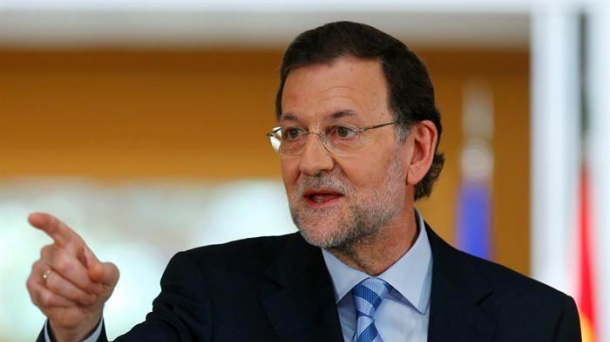news
Bailout
Eurozone agrees to lend Spain up to 100 bln euros
Reuters
Brussels/Madrid
Spain said it wanted aid for its banks but would not specify the precise amount until two independent consultancies deliver their assessment of the banking sector's capital needs.
-

Prime Minister Mariano Rajoy. Photo: EFE
Euro zone finance ministers agreed on Saturday to lend Spain up to 100 billion euros ($125 billion) to shore up its teetering banks and Madrid said it would specify precisely how much it needs once independent audits report in just over a week.
After a 2 1/2-hour conference call of the 17 finance ministers, which several sources described as heated, the Eurogroup and Madrid said the amount of the bailout would be sufficiently large to banish any doubts.
"The loan amount must cover estimated capital requirements with an additional safety margin, estimated as summing up to 100 billion euros in total," a Eurogroup statement said.
Spain said it wanted aid for its banks but would not specify the precise amount until two independent consultancies – Oliver Wyman and Roland Berger - deliver their assessment of the banking sector's capital needs some time before June 21.
"The Spanish government declares its intention to request European financing for the recapitalisation of the Spanish banks that need it," Economy Minister Luis de Guindos said at a news conference in Madrid.
He said the amounts needed would be manageable and that the funds requested would amply cover any needs.
Fourth country
A bailout for Spain's banks, beset by bad debts since a property bubble burst, would make it the fourth country to seek assistance since Europe's debt crisis began.
With the rescue of Greece, Ireland, Portugal and now Spain, the EU and IMF have now committed around 500 billion euros to finance European bailouts.
Washington, which is worried the euro zone crisis could drag the U.S. economy down in an election year, welcomed the announcement. "These are important for the health of Spain's economy and as concrete steps on the path to financial union, which is vital to the resilience of the euro area," U.S. Treasury Secretary Timothy Geithner said.
Likewise, the Group of Seven developed nations - the United States, Germany, France, Britain, Italy, Japan and Canada - heralded the move as a milestone as the euro zone moves toward tighter financial and budgetary ties.
Heated debate
Officials said there had been a heated debate over the International Monetary Fund's role in Spain's bank rescue, which Madrid wanted kept to a minimum. The IMF will not provide any of the money.
In the end it was agreed that the IMF would help monitor reforms in Spain's banking sector, while EU institutions would ensure Spain stuck to its broader economic commitments.
IMF Managing Director Christine Lagarde said the euro zone's plan was consistent with the IMF's estimate of the capital needs of Spain's banks and should provide "assurance that the financing needs of Spain's banking system will be fully met."
Sources involved in the talks said there had been pressure on Madrid to make a precise request right away, but Spain had resisted.
Euro zone policymakers are eager to shore up Spain's position before June 17 elections in Greece which could push Athens closer to a euro zone exit and unleash a wave of
contagion. Spain's auditors could report back after that date. Nonetheless, analysts said financial markets may be calmed by the announcement when they reopen on Monday.
The Eurogroup said the funds could come from either from the euro zone's temporary rescue fund, the EFSF, or the permanent mechanism, the ESM, which is due to start next month. Finland said that if money came from the EFSF, it would want collateral.
EU sources said there was a preference to channel money to Spain through the ESM, rather than the EFSF. Under the ESM, an approval rate of 90 percent or less is needed to trigger aid, and the fund also has more flexibility in how it operates.
The Spanish government has already spent 15 billion euros bailing out small regional savings banks that lent recklessly to property developers. Spain's biggest failed bank, Bankia , will cost 23.5 billion euros to rescue and its shareholders have been wiped out.
"Whatever the formula being used, we need to say two things: first the innocent should not suffer for the guilty, second public money should come back to public coffers," said Socialist opposition chief Alfredo Perez Rubalcaba after speaking with Prime Minister Mariano Rajoy on Saturday morning.
top stories



-
news
New anti-eviction law
Andalucia begins proceedings to seize confiscated houses from banks
-
news
London attack
British police ponder conspiracy after soldier murder
-
Sport
Giro d'Italia
Nibali tightens grip on overall lead after stage victory
© EITB - 2024 - Privacy Policy - Legal disclaimer - Cookie Policy - Cookie settings


